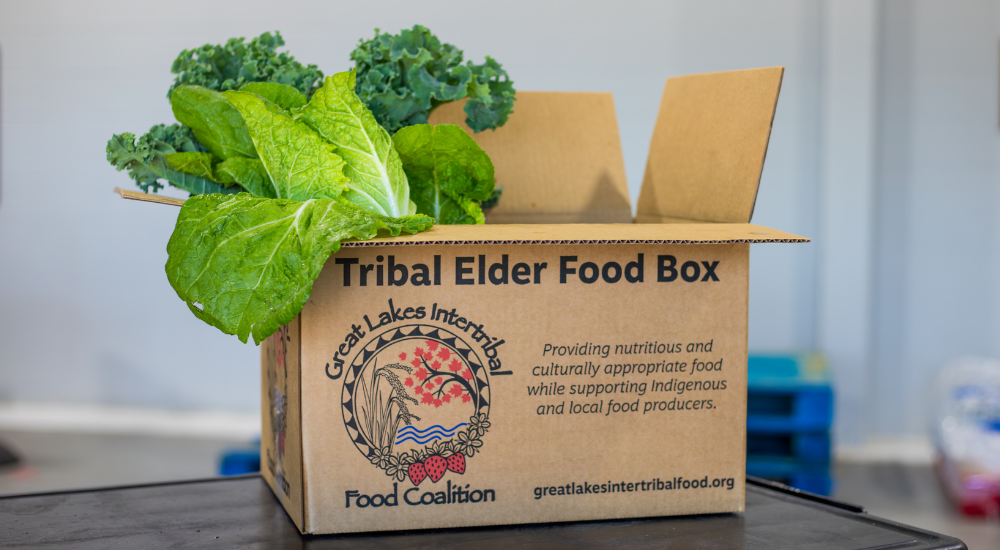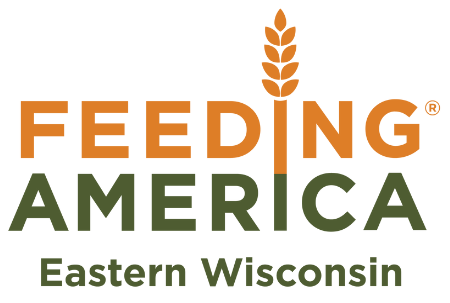Cultivating Wellness: Tribal Elder Food Box Program Focuses On Food As Medicine

When the pandemic struck, older adults and those who had preexisting conditions were among the most endangered. For Wisconsin’s Tribal communities – which were disproportionately impacted by the virus – the losses were devastating.
“We were losing our most vulnerable and most valuable of people – our Elders, who are our knowledgekeepers and our culture keepers,” said a member of the Great Lakes Intertribal Food Coalition, or GLIFC.
Many of these Elders had experienced health conditions like diabetes, hypertension, heart disease, and obesity. And with Native American populations experiencing food insecurity at a rate about twice the rate of white populations, limited access to healthy foods can often exacerbate these conditions.
When emergency food boxes were distributed in response to the pandemic, Tribal leaders recognized the boxes typically did not reflect traditional indigenous health-promoting foods and the items included often amplified existing chronic illnesses.
In the Fall of 2022, several Tribal partners came together, in collaboration with Feeding Wisconsin, to coalesce efforts to source healthy foods from local and Tribally-owned businesses. That’s when they formed GLIFC, which supports the economic development of indigenous and local food producers in the Great Lakes region, with the vision of an Intertribal Food Hub.
Soon after, GLIFC, which is made up of elected delegates from all 11 Federally-recognized Tribes in Wisconsin and other partnering organizations including Feeding America Eastern Wisconsin, developed the Tribal Elder Food Box Program.
The program provides nutritious and culturally appropriate foods for Tribal members over age 55 – helping to heal individuals as well as Tribal communities as a whole by strengthening indigenous food networks.
“This is a practice of recovery and preservation by utilizing the resources that we’ve always had,” a GLIFC member said.
These farm-to-table food boxes contain proteins and seasonal produce representative of the traditional, indigenous foods as desired by Tribal Elders, including grass-fed beef, bison, wild-caught fish, chicken, pork, white corn flour, greens, apples, berries, heirloom white corn, beans, squash, potatoes, tomatoes, jams, maple syrup, and dried teas. These foods align closely with the traditional diet of Great Lakes Indigenous Peoples, which avoids added preservatives or pesticides.
Tribal leaders also wanted to ensure food was harvested and produced in a sustainable way while strengthening local economies, revitalizing historic trade routes.
During its first year, the program reached seven Tribes in Wisconsin and Michigan with 10,800 boxes of food, enlisting seven indigenous producers to supply food products.
By the end of 2023, GLIFC and the Tribal Elder Food Box Program had provided more than 2,300 Tribal homes with nearly 64,000 culturally specific and nutritious food boxes.
GLIFC has also secured significant grant funding to help support smaller-scale Tribal farmers and producers, helping to create food sovereignty for the Tribal nations. “It’s a big deal—that’s how you create sustainability. There’s value in supporting these small producers, and seeing it continue.”
The Tribal Elder Food Box Program purchases food products for the program using a ‘waterfall’ structure, with highest priority going to Native/Tribal descendancy, followed by other identifying BIPOC producers, and then to other local Wisconsin producers, prioritizing those who grow organically.
The program now includes 65 producers, 33 of which are Tribal producers in Wisconsin, Minnesota, and Michigan. GLIFC is working to expand capacity, building an even broader coalition of Tribal producers as the Tribal Elder Food Box Program grows. In the Ho-Chunk Nation, for example, a grant will allow comprehensive farmer recruitment training to kick off early next year. The program will teach “anything and everything that we need to get our people producing.”
The training will include different tracks such as urban farming and gardening, and will focus on building skills and creating access to land, equipment, technical assistance, and more. Farmers can include those who are conventional
farmers, backyard gardeners, food foragers, tree tappers, or anyone who aspires to be.
A member of GLIFC notes “The people that help and take part in what we’re doing are our food warriors. They’re not doing it to get rich, but they’re doing it, and that’s how we were taught. Take care of yourself, your family, your neighbors. If everyone does that, look what we’ll have – a thriving beautiful community and reservation.”
To learn more about the Tribal Elder Food Box Program, visit FeedingAmericaWI.org/Tribal-Food-Security.

